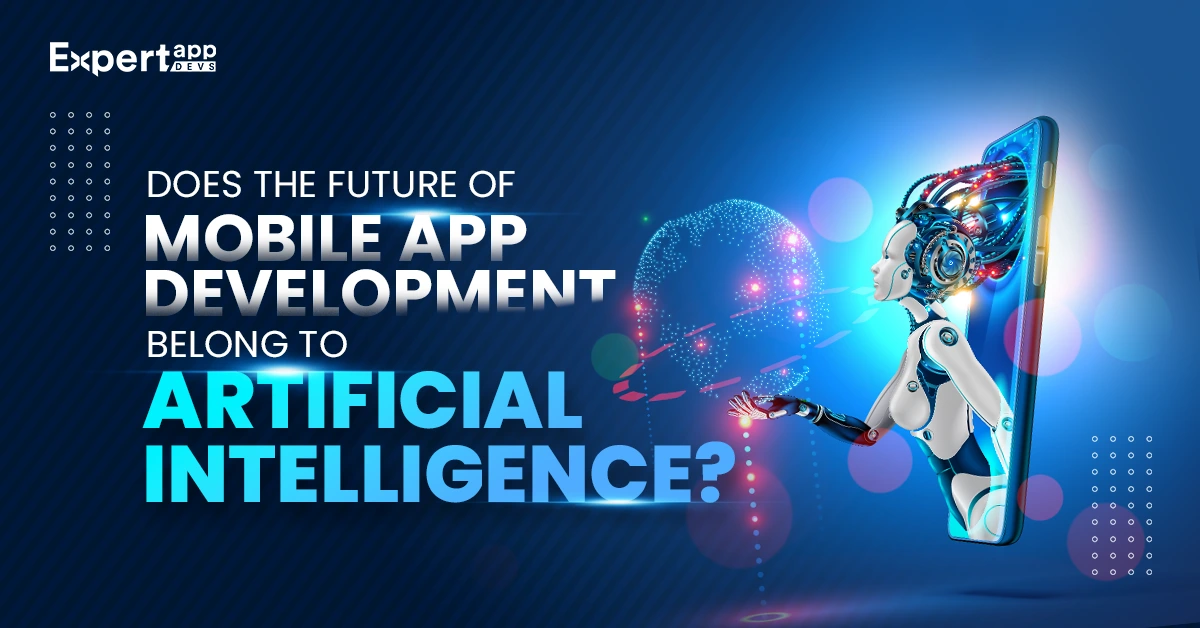Does the Future of Mobile App Development Belong to AI?
Artificial Intelligence has shown some awe-inspiring promises in recent years in various ways. A study reveals that the global AI market will reach $2 trillion by 2030. AI is slowly making its place in almost all industry verticals, from self-driving cars to voice assistants.
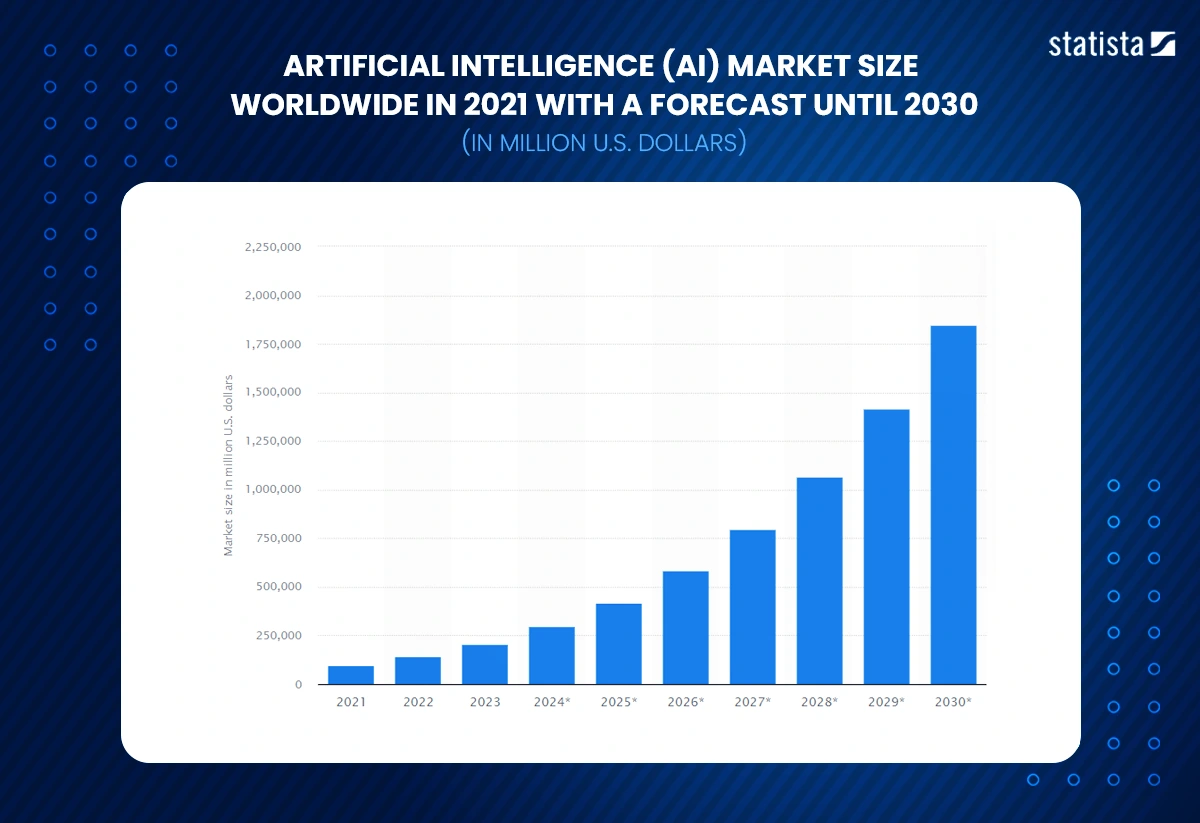
Today, eCommerce businesses use AI chatbots to serve their customers better. Online AI players defect humans in chess and other games. Users can get personal product recommendations with Machine Learning, a branch of AI.
The recent invention, ChatGPT, can help write a wide range of content types, including software coding. Undoubtedly, AI will indeed dominate the world in recent years.
Mobile apps are no longer an exception. Businesses understand how AI can help shape users' journeys and offer a great user experience. Integrating AI into your mobile app can serve your customers better and more meaningfully with mobile app intelligence.
If you want to know how to create an app using AI, this post is for you. In this post, we will thoroughly discuss all the aspects of mobile app development using AI. Stay tuned!
What Can AI Bring To Your Business?
Integrating AI into your mobile app can help businesses in numerous ways. Companies have no option, as their competitors have already started using AI in their endeavors. If you want to know some of the benefits of bringing AI to your business, here is a list.
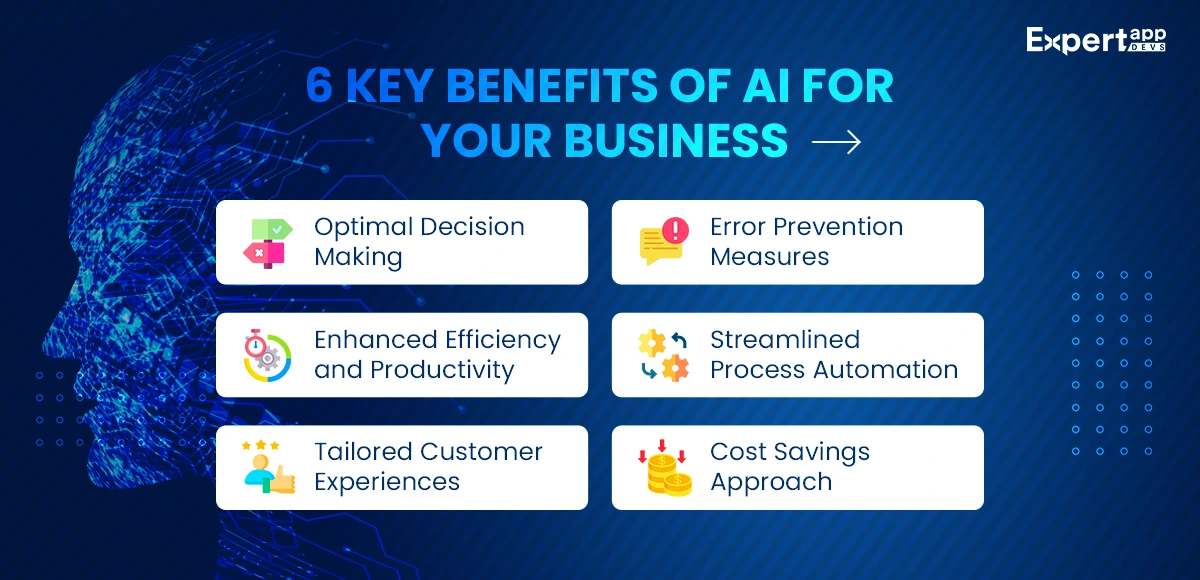
#1. Better Decision-Making
Organizations receive a large amount of data from various sources. You can use AI-powered predictive analytics to process and analyze this data for valuable insights. Such insights can help you make data-driven user, process, and business operations decisions.
#2. Improved Efficiency and Productivity
The best thing about AI is that it can perform tasks at a volume and velocity that humans cannot match. This is the significant benefit of integrating AI into your processes. AI can perform various kinds of tasks without compromising efficiency and productivity. AI boosts productivity and efficiency to a great extent.
#3. Personalized Customer Services and Experiences
AI algorithms use data to evolve and learn. When these algorithms receive crucial data consistently, it help businesses to offer highly personalized customer services and experiences to users. You can create offers based on individuals' interests, styles, and preferences. It improves your chances of winning their trust and loyalty.
#4. Mitigating Errors
Human involvement invites errors, but AI does not. AI can be a boon in organizations where repetitive tasks and processes contain regular errors.
AI automates the tasks, eliminating any human need. It ideally mitigates errors and mistakes as no human involvement is there. You just need to know how to use Artificial Intelligence in mobile app development.
#5. Process Automation
AI can automate various processes, allowing you to utilize your resources better. It improves the speed of business without compromising on quality and efficiency. Furthermore, you can manage your human personnel wisely as AI performs repetitive tasks.
#6. Saves Costs
AI can also reduce your overhead costs by a significant margin by performing various tasks. Also, AI can help streamline your business processes and operations, saving a lot of money. You can allocate your human resources wisely with AI, making processes more efficient and productive.
How to Create an App Using AI?
Whether you want to develop an iOS or Android AI application, there is a process to follow. Hire AI developers with a proven track record and experience in AI-based mobile app development.
#1. AI App Development Process
Developing an AI app for your business takes time and effort. Developers have to build complex AI algorithms and code. Thankfully, unlike earlier days, developers have advanced app development tools and technologies to make their jobs easier.
Let's dive into the app development process with AI.
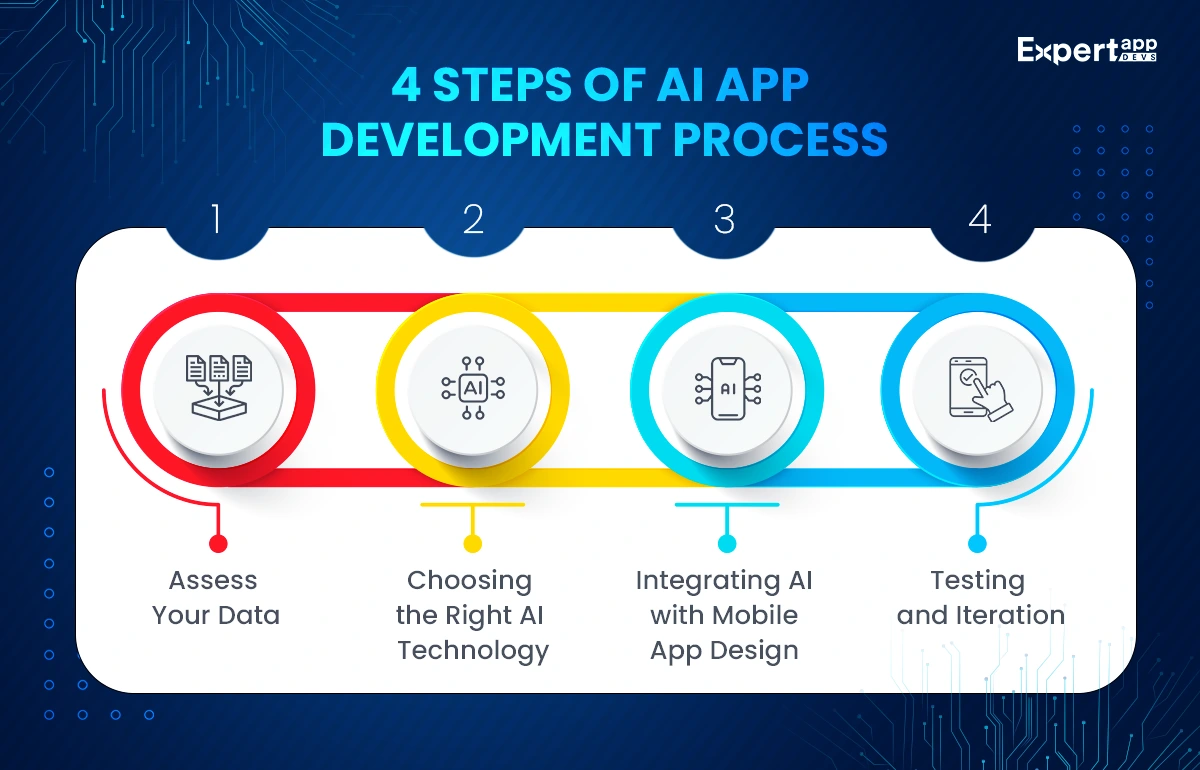
Step 1: Assess Your Data
AI implementation depends on the data you feed. Hence, cleaning, analyzing, and processing the data is crucial before the app development process starts.
You must use properly formatted data with all the information in it. You will require AI app developers to ensure high-quality and feature-rich mobile apps with mobile app intelligence.
Step 2: Choosing the Right AI Technology
Another thing is to choose the right AI technology. Developers generally analyze business goals and data before selecting the right AI technology.
They can use open-source frameworks like TensorFlow or choose Cloud services like Amazon Web Services. Determine features and functionalities you want to integrate into the app. It will help you choose the right technology.
Remember that different platforms and technologies offer additional AI integration capabilities. Choose the right technology based on your business goals and needs.
Step 3: Integrating AI with Mobile App Design
Once you develop the AI model, you must integrate mobile app design with AI. AI can tell you so much about user expectations and predictions.
The AI-based plan will help you offer exactly what your audience looks for. It will improve user engagement and participation. Also, it will reduce the abandonment rate of the app.
Step 4: Testing and Iteration
Iteration is one of the core components of the mobile app development process. Developers divide the app development process into multiple iterations. Each iteration has components like planning, designing, coding, testing, and reviewing the app's features and functionalities.
Each iteration helps developers review the app's workflow and get user feedback. It helps them to improve the next iteration.
Also, you must test the app thoroughly to ensure that all the features and functionalities work fine and as expected. Deploying an app with testing will help your brand positively. Ensure the app's release has no errors or bugs to receive maximum attention.
#2. Android AI Application and iOS AI Application
Android and iOS are mobile app platforms with different prerequisites and tools to develop mobile apps. Let's check out the differences and similarities in developing AI apps for Android and iOS platforms.
#1. Android and iOS App Development Differences
First, we will discuss the differences between Android and iOS applications.
✓ Programming Languages
Technology stacks differ in Android and iOS app development, especially in programming languages. Android developers rely heavily on Java and Kotlin for high-end Android apps. On the other hand, iOS developers use Swift, an official programming language for iOS app development.
Coding in Swift is relatively easy and saves time and effort compared to Java and Kotlin. The learning curve for Swift is shorter compared to Kotlin.
✓ Development Environment
The development environment also differs for Android and iOS development. For example, Android developers use Android Studio, a proprietary tool developed by Google with high-end features, good readability, and various tools and debugging features.
On the other hand, iOS developers also have a proprietary tool called XCode. It also has a wide range of tools and is easy to learn and adopt.
✓ System-Specific Design Differences
Android and iOS also have design differences, especially in navigation and architecture organization.
While developing an Android app, developers will use the philosophy of partition, breaking the app down into different fragments and activities. One activity is one app screen. Sometimes, developers work on multiple activities.
iOS app development relies on view controllers. Some view controllers are page view, tab, split view controllers, etc. One view controller can control a whole app or some of its parts.
Developers manage these controllers by writing them in code, drawing images in a storyboard, and storing them as an XML file.
✓ Development Complexity
iOS is far more straightforward when it comes to app development. Android developers must deal with device fragmentation because of to the market's wide range of Android devices. Apple has a limited number of devices and, hence, has a limited number of screen dimensions. Android developers have to deal with different screen types with different screen sizes, densities, and OS versions.
#2. Platform-Specific AI Features
There are some platform-specific AI features that you can add to the apps to improve the user experience for users.
→ Android AI features
✓ ML Kit
ML Kit allows users to use pre-made APIs to perform AI tasks like face detection, text identification, barcode scanning, etc. You can use this kit on both the cloud and the device. It also supports TensorFlow and Firebase for app development.
✓ TensorFlow Lite
It is another tool developers can use in an Android AI app to have on-device ML inference with low latency and small binary. It is a smaller version of TensorFlow but is highly effective and specifically designed for mobile and embedded devices.
✓ Android Neural Networks API
If you are using TensorFlow Lite and ML Kit for your Android app, you will need an NNAPI which offers a base layer for these frameworks to run ML models on Android devices.
→ iOS AI features
✓ Core ML
Core ML allows developers to integrate ML models like neural networks, decision trees, vector machines, NLP, and others into iOS apps. Furthermore, the Core ML framework can also leverage Apple's Neural Engine to offer a superfast performance. It also supports CPU and GPU.
✓ Create ML
Create ML is an AI tool for developers to build and train custom ML models on Mac devices with Swift code. This tool also supports images, texts, tabular, and sound data as inputs. If you want to export ML models to Core ML format, this tool can do it for you.
✓ Vision
Mostly, developers use Vision for image analysis. It is a framework with superior APIs, face detection, face landmarks, text detection, object tracking, etc. Also, it leverages Core ML models to perform custom tasks like image classification.
✓ Natural Language
Natural Language Processing NLP is crucial for AI apps. Natural Language is a framework with high-level APIs for NLP purposes. Also, like Vision, it can leverage core ML models for tasks like text classification and sequence labelling.
Why is Implementing Artificial Intelligence In Mobile App Development Becoming Popular?
#1. The Rise of AI Apps on Android and iOS
As businesses now understand the benefits and possibilities of implementing AI in mobile apps, the rise of AI apps has also increased. Businesses belonging to almost all industry verticals are investing heavily in AI-powered mobile apps.
→ AI Phone App Innovations
AI technology is shaping the future of mobile apps. Recently, businesses have launched many AI-enabled mobile apps like Replica AI, ChatGPT, Descript, Freeletics, Be My Eyes, Bing AI, Google Assistant, etc.
Businesses now understand how AI can help predict buyer behaviors, improve user experiences, and make data-driven business decisions. With the right AI-enabled app, you can have a competitive edge. Also, they can offer personalized products and services to users to win their trust and loyalty. AI phone app innovations will surely rise in the upcoming times.
→ Popular AI Apps on Android and iOS
Now, let's check out some popular AI apps developed for Android and iOS applications.
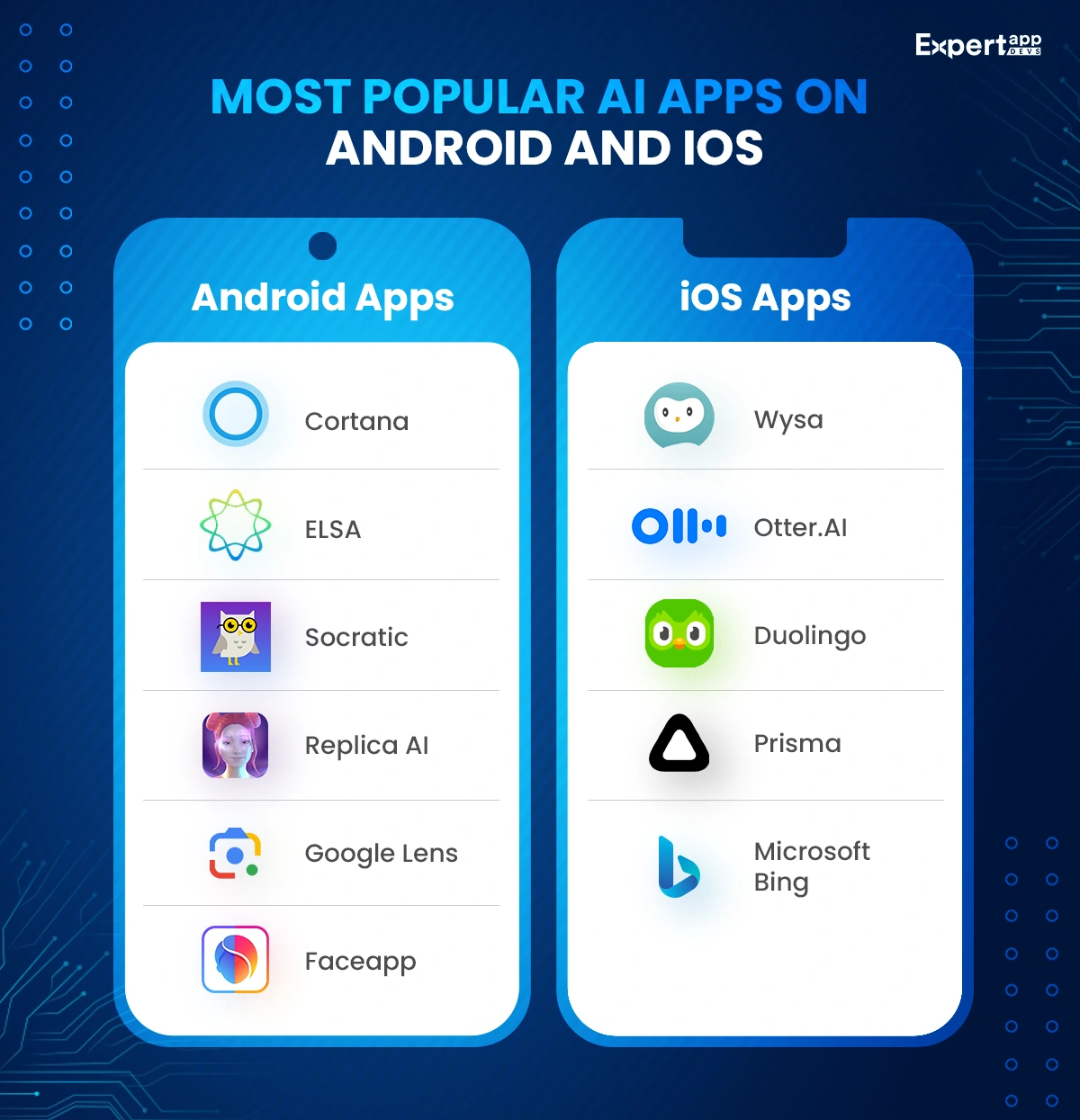
#2. Benefits of AI-Enabled Mobile Apps
Why do you need to integrate AI into your mobile app? Here is a list of reasons.
→ Advanced App Authentication
With time, AI algorithms will become more advanced and learned. It helps strengthen the app's authentication process by protecting it against security vulnerabilities and possible unauthorized attempts. Developers can use AI in speech and facial recognition to identify the device's owner. The app will give access to only authorized people to improve security.
→ Personalised User Experience
With data analytics and machine learning technologies, businesses can offer highly personalized user experiences. Mobile apps can use data insights to predict human behaviors and interests. They can recommend products and services based on individual interests.
→ Learning Behavioural Patterns
AI apps can also help businesses understand the expectations of users. They can optimize app features, design, content, and navigation based on user preferences. It also allows companies to update user-centric features in the future. They can design more user-friendly interfaces to offer highly satisfying user experiences.
→ Efficient Data Analysis
AI can help businesses analyze data efficiently and accurately. You can have precious data insights to help make decisive business decisions. Highly advanced AI apps can help beat the competition by offering exact data analysis.
→ Enhanced User Engagement
AI-enabled mobile apps can help businesses achieve enhanced user engagement. When businesses give personalized offers to users, they will surely reciprocate. Also, with AI, you can keep the needs and expectations of the users in mind while designing products and services. As you have valuable data insights, it helps businesses deliver the finest, user-centric offers, contributing to user satisfaction and user engagement.
Why Consider Developing AI-Integrated Apps in Businesses?
Artificial Intelligence AI comes with many possibilities and opportunities for businesses. AI can contribute to almost all departments, from predictive analytics to data-driven decisions to better customer service. You can automate repetitive tasks, mitigate human-made mistakes, make processes efficient, and save overhead costs significantly. In short, you have something to gain from AI-integrated apps.
We have witnessed how Alexa and Siri simplify our lives with voice-based searches. Smart cars don't need drivers as they are AI-enabled. AI also opens many other possibilities, like
- Streamlining Tasks And Operations
- Natural Language Processing
- Improved Collaboration Among Teams
- Intelligent Personalization
- Quality User Experience
- Better Customer Service
- Valuable Data Insights For Smart Decisions
- Increased Efficiency And Productivity
#1. The Future of Implementing Artificial Intelligence in Mobile Apps
→ Predictions and Trends
AI will play a crucial role in mobile app development in the future. Implementing AI in apps will pay huge dividends to businesses. AI will offer the target audience a highly satisfying user experience, from streamlining processes to increased personalization to voice and natural language dominance.
Also, some AI trends will take over mobile app development, like deep learning breakthroughs, contextual awareness, explainable AI, etc.
→ AI in Apps
As discussed, AI will play a huge role in fulfilling user expectations through mobile apps. From hyper-personalization to enhanced efficiency and automation, AI will make things easier for businesses to reach out to their audiences with mobile app intelligence. AI in apps is no longer an option for businesses as it has become necessary.
In almost all industry verticals, an AI solution will play a significant role. For example, healthcare apps will have advanced AI algorithms to track user activities to provide personalized diet, treatment, and fitness recommendations.
Similarly, gaming apps will have integrated technologies like AR and VR to offer highly immersive gaming experiences to users.
Also, natural language processing will ensure smooth interaction with diverse groups of users without any barriers.
In short, AI has immense potential to provide future breakthroughs in mobile app development.
#2. Impact of Artificial Intelligence on Mobile Application Development Process
→ Streamlined Development
AI can help revolutionize mobile app development. For example, AI can identify possible vulnerabilities and find solutions to streamline development. The technology can identify inevitable human errors and show ways to mitigate them. With AI, developers can have streamlined workflows to save time and effort.
→ Lesser Coding with AI tools like ChatGPT
Advanced AI tools like ChatGPT can also do coding for you. It can code for your app development project, making things convenient for developers.
→ Predictive Analysis in App Behavior
AI can also help in performing predictive analysis for your app. AI can help developers understand how an app will behave with certain features and functionalities. However, you must feed the correct data and develop advanced AI algorithms for predictive analysis.
Digital transformation is not just a buzzword; Almost all industry verticals now understand the immense potential behind this powerful strategy. Read How Mobile Apps Will Impact the Workplace in 2025 and Beyond.
Top Artificial Intelligence Technologies That You Can Use In Mobile Apps
Choosing the right AI technology for your project is vital for the app's success. Before selecting the right AI technology, you must evaluate your app, features, business goals, and scalability objectives.
#1. AI App Ideas and Innovations
As a startup, you need a concrete AI app idea to rule the market. You need to think out of the box to have an idea that can change people's lives or make them more comfortable.
We have listed some ideas here:
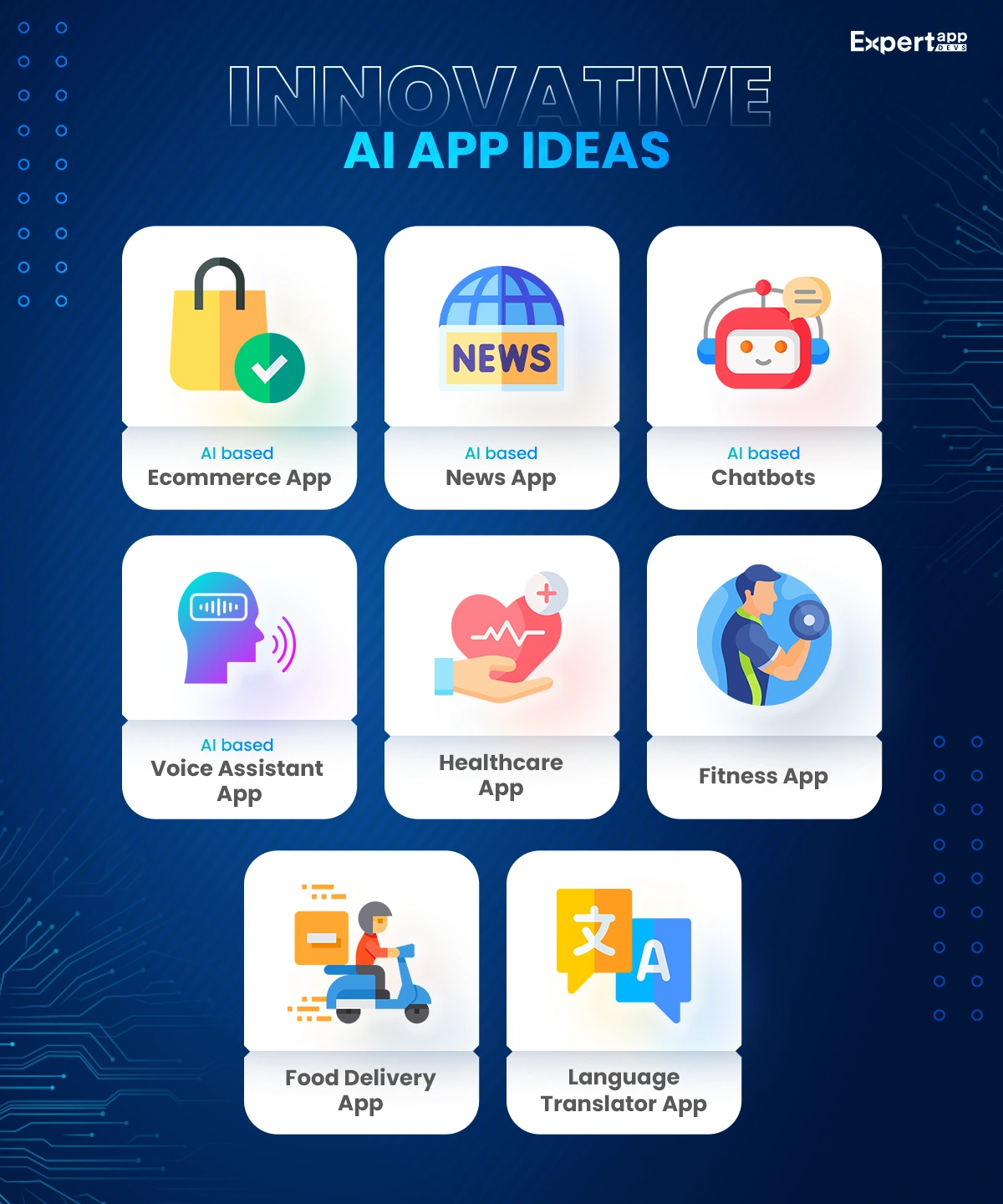
You can create app using AI technologies that are highly advanced and future-ready, Technologies like machine learning, blockchain, Metaverse, OpenAI, and others will surely pave the way to developing feature-rich AI apps to serve customers better with highly personalized offers and experiences.
→ Chatbots and Virtual Assistants
Organizations across all industry verticals now use various types of AI chatbots to respond to customers instantly. You must have seen AI chatbots while surfing websites.
These chatbots offer data-driven answers to queries raised by customers. Mainly, these chatbots provide primary information to users. These chatbots redirect the query to customer care representatives in complex inquiries or questions.
Virtual Assistants help businesses to help in their day-to-day affairs. They perform repetitive tasks like scheduling, booking appointments, replying to emails, etc.
→ Image and Voice Recognition
Images and voice recognition also will play crucial roles in future AI apps. Mobile apps will have advanced features of pictures and voice recognition for users.
Voice recognition is a technology that identifies speech in different languages. Mainly, developers use it to improve the app's security and safety. Alexa and Siri are prime examples of this technology.
On the other hand, image recognition is a computer vision technology that identifies and classifies various objects, text, and actions in digital images. Medical imaging is a prime example of image recognition. It identifies patterns and irregularities in images with computer vision.
#2. AI for App Development
→ Tools and Platforms
Many AI tools and platforms are available for mobile app development. Some AI platforms are:
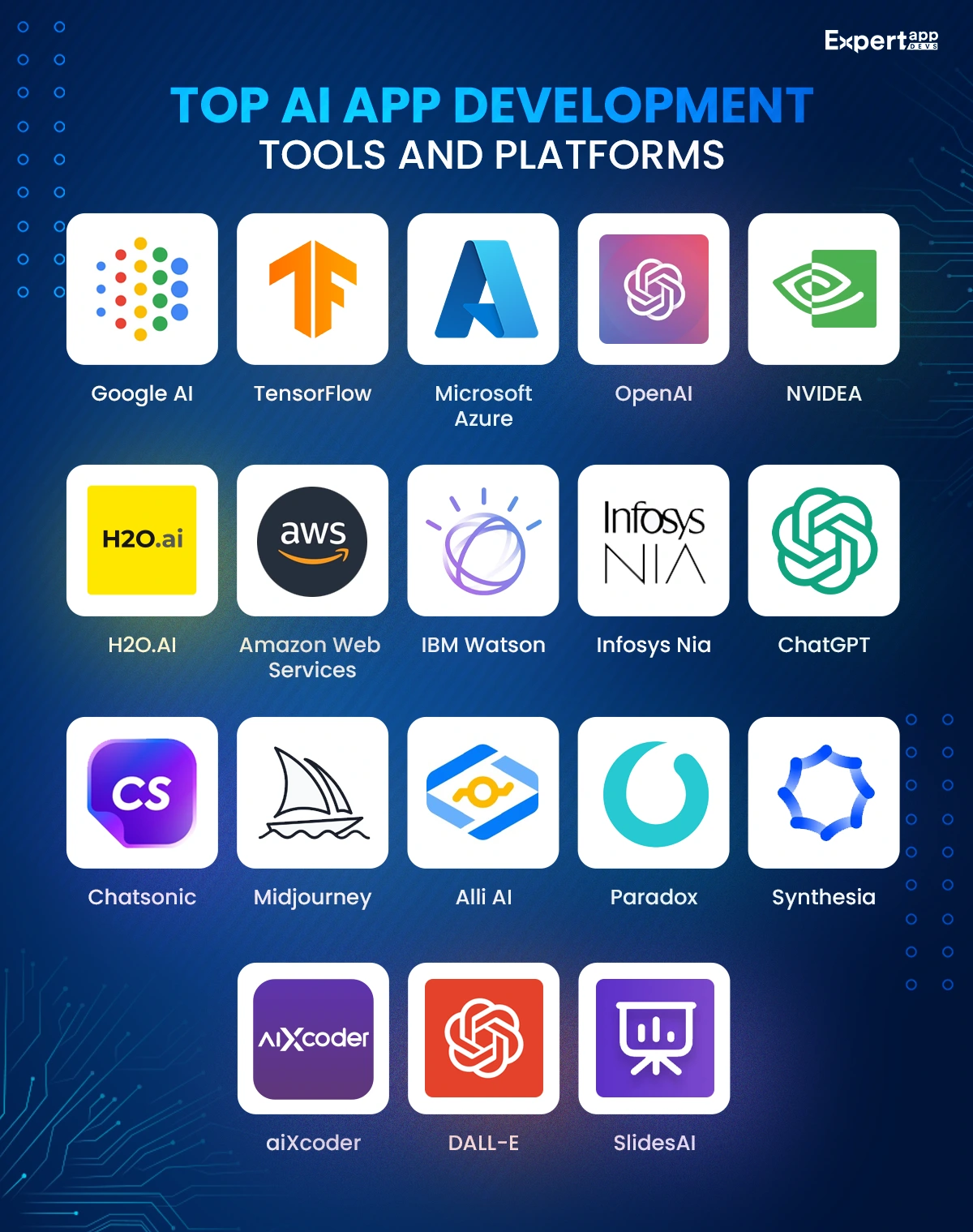
→ AI App Developers and Companies
You will find many AI app developers and companies while searching the internet. However, you need to be careful while choosing them. An incompetent company or a developer might ruin your project. Hence, choosing the right company with experienced AI developers is essential.
Choose a software developer or company with a proven track record in developing AI systems. Also, ensure they have state-of-the-art infrastructure and tools for AI app development.
Most mobile app development companies follow the agile app development approach. Ensure that the company you choose follows it or not.
Hiring dedicated developers can help you develop Artificial Intelligence apps faster. The dedicated developers model works perfectly for you as developers work solely on one project at a time. Hence, you get more dedication and commitment from developers.
Guidelines for Implementing Artificial Intelligence in Mobile Apps
Implementing Artificial Intelligence in mobile apps is a complex task. However, the process would be simpler with the right AI app development company. All you need is the right mix of talent and creativity to develop advanced AI apps.
#1. Best Practices and Considerations
→ Ethical Considerations
When implementing AI in mobile app development, you must consider various ethical considerations. AI can transform society significantly, but you must consider ethical issues like data privacy, transparency, accountability, bias, discrimination, etc.
→ User Privacy and Data Security
Today, data is the new power. When you receive a massive amount of data from various sources, you must ensure privacy and security. For example, an AI-enabled healthcare app has sensitive patient case file data. Now, you must understand the value of such data.
From using the data to create advanced algorithms to sharing the data with third parties, you have to act responsibly after obtaining the consent of other stakeholders.
#2. How Do You Develop an AI App?
Let's briefly check out how to develop an AI app for your business.
→ Steps and Procedures
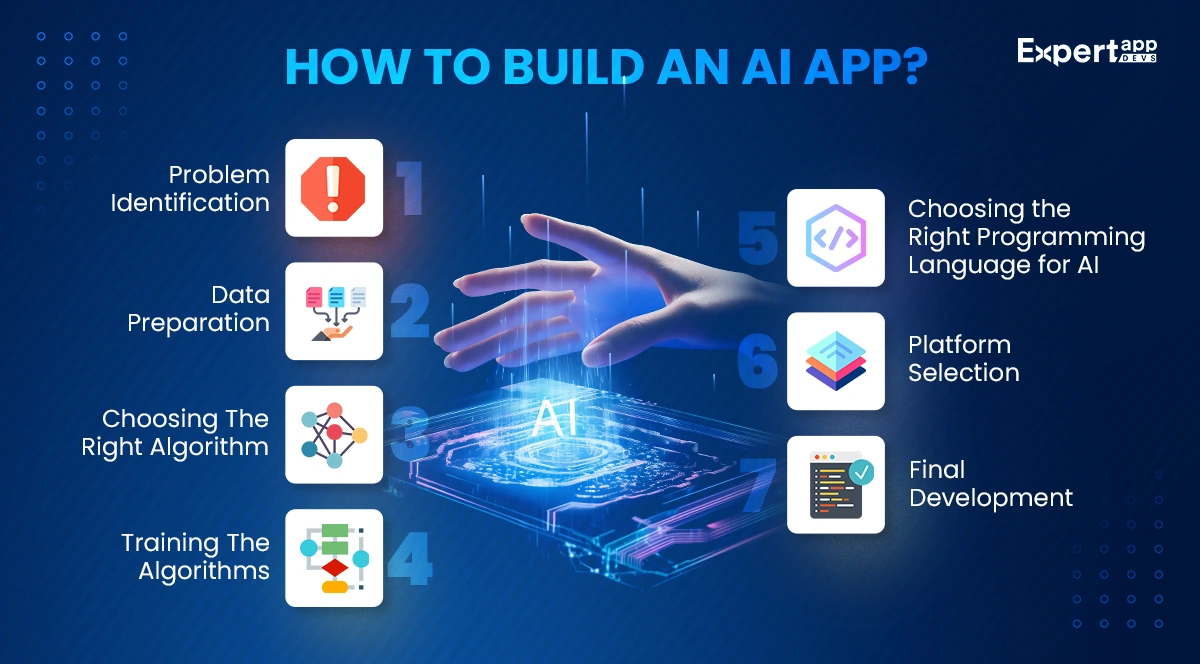
Step 1: Problem Identification
The first step is understanding the problem. What are the issues that you want to address through the AI app? It will help determine your product features.
After analyzing requirements, developers can determine the technology stack and other development aspects.
Step 2: Data Preparation
AI-enabled mobile apps will require massive data for their functioning. However, before working on data, you must collect, process, and analyze data for its proper usage. With relevant experience creating AI and ML models, AI developers will label the collected data. Also, developers will verify the input data, select annotation tools, label and highlight data, and process data selection.
Step 3: Choosing The Right Algorithm
The third step is to choose the correct data algorithm for your mobile app. This is the most crucial step in building an AI mobile app or system. You must understand the fundamental concepts of building an AI algorithm. You can have algorithms of different types based on the learning type.
There are two types of learning types:
Supervised Learning
Here, the machine gets a dataset and trains itself based on it to offer the required results. Some popular supervised learning models are Support Vector Machine, Logistic Regression, Random Forest Generation, Naive Bayes Classification, etc. For loan defaulting and regression tasks, you can use these algorithms in finance apps.
Unsupervised Learning
The machine does not have a labeled dataset in the unsupervised learning type. Instead, developers use them for clustering, association, and dimensionally reduction.
Once you know the fundamental concepts of these two types of learning and the available AI algorithms in the market, you will get a clear idea about which one to choose for your project.
Step 4: Training The Algorithms
Before you start using the algorithm, you must verify its accuracy. Hence, developers believe that testing is necessary. You must look at the algorithm functions within the chosen framework through training and retraining.
AI algorithms are based on the data, so they will behave according to the data they receive. You need a diverse data set to make the AI model perform exactly as expected. Training the algorithm is a mandatory step to increase its efficiency and accuracy.
Step 5: Choosing the Right Programming Language for AI
You can choose from a wide range of programming languages available. However, selecting the language based on your project requirements, objectives, and scalability goals is essential. For example, some programming languages are excellent at handling extensive data. On the other hand, some languages are good at natural language processing.
Carefully evaluate the strengths and limitations of each language before choosing the right one. Some programming languages that you can choose from are Python, Java, Prolog, Smalltalk, Rust, Lisp, R, and C++.
Step 6: Platform Selection
You will need various APIs and frameworks with features like deep learning, neural networks, NLP applications, and others to build AI algorithms. Choosing the right APIs and platform for your AI app will depend on factors like:
- The Choice Of Cloud Platform
- Data Storage Location And Ownership
- Limitations Of The Programming Language
- Region-Specific Availability Of Apis
- The Total Cost Of AI Development Life Cycle
Step 7: Final Development
Now, the final development phase starts. AI developers will begin working on the app's design, architecture, front-end, and back-end.
Step 8: Testing and Deployment
Once the development ends, you will need experienced testers to test the app thoroughly for functional or technical vulnerabilities. Once the testing is over, deploy the product to the production server. Also, you must ensure that developers update and maintain the app to ensure high user engagement.
→ Working with an AI App Development Company
Choosing the right AI app development company is crucial to achieving the desired outcomes. Ensure the app development company has the experience and expertise to build an app with AI. Check their testimonials and track record before choosing it. Also, discuss your expectations, features you want to incorporate into the app, timeline for the app, cost, and other app development aspects.
Artificial Intelligence in Mobile Apps: Beyond Development
AI will soon become an integral part of mobile app development, considering the promises and opportunities it offers to businesses. With AI implementation in mobile apps, you can achieve hyper-personalization, efficient processes, and human-like Intelligence.
#1. Uses of AI: From Entertainment to Productivity
There are various uses of AI, in almost all industry verticals, including entertainment. For example, with AI, you can develop mobile games or content creation apps with highly immersive user experiences with technologies like AR and VR. You can also create highly personalized news articles, interactive video games, and other apps.
Furthermore, businesses can use AI to create personalized content for users per their preferences and interests. Also, AI can offer advanced features in tasks like video editing, sound design, and special effects.
Also, AI can enhance productivity by automating processes, operations, and tasks. AI can automate repetitive day-to-day tasks to save time and effort. You can better utilize your human resources. AI can reduce overhead costs and improve productivity and efficiency.
→ What Can AI Be Used For in Mobile Apps?
Developers can use AI in various ways in mobile apps to improve user experience, automate processes, and make data-driven decisions. Let's check some uses of AI in mobile apps development to get some clarity.
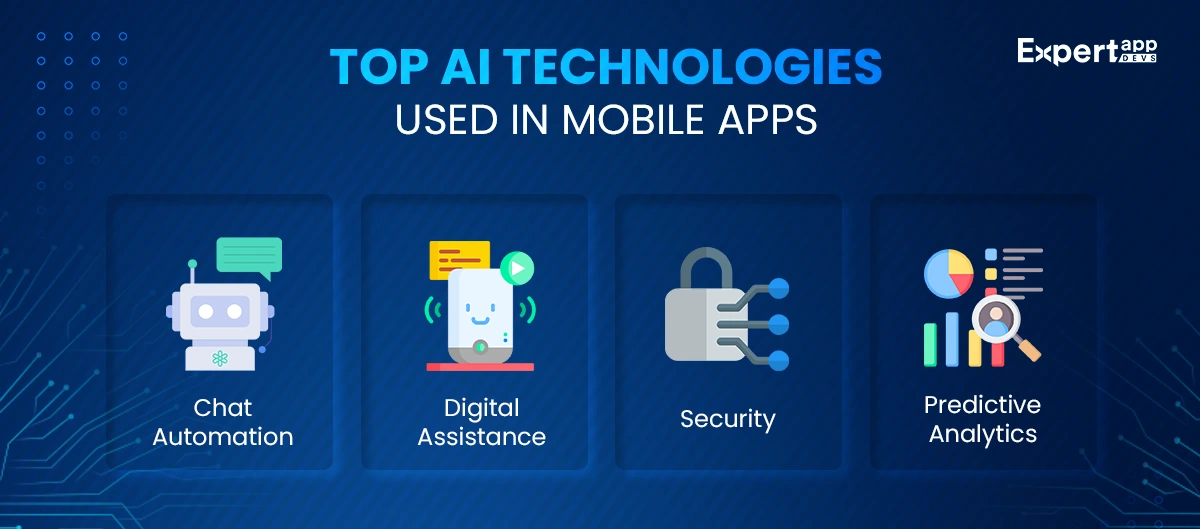
✓ Chat Automation
Offering instant and excellent customer support is the need of the hour. The competition is fierce, and you must respond creatively to customer queries. Handling a massive number of questions with human resources is time-consuming and costly.
AI can come to your rescue with automated AI-based chatbots. With features like NLP, chatbots can respond to queries automatically. Trained chatbots will first decipher the query, find the relevant answer, and present it to the user.
Developers use AI chatbots in ecommerce websites and mobile apps. From fintech to retail to healthcare, AI chatbots show their potential to simplify customer support.
✓ Digital Assistance
Virtual assistants can help businesses handle day-to-day tasks. Not only that, but they can also help interpret voice commands and carry them out. Suppose you want to incorporate AI in internal processes like Data Center or Customer Support. In that case, it can provide digital assistance by creating support scripts, offering dialogue suggestions, and helping deliver highly relevant customer support to your customers.
✓ Security
AI can also help in strengthening your app's security. AI implementation in mobile apps can help handle large amounts of data and identify possible security vulnerabilities. As Machine Learning algorithms learn from past experiences, the security of your app will improve with time.
✓ Predictive Analytics
Predictive Analytics help businesses analyze performance, gain valuable data insights, and improve service delivery. However, with AI, you can go one step beyond that. Advanced AI tools can help predict your customers' user behavior, interests, and likes. Also, you will get demand forecasts, process vulnerabilities, and other aspects to improve efficiency and productivity.
→ Expanding Horizons: New AI App Ideas
Various exciting and innovative AI app ideas you can think of. For example, you must have come across apps that predict the face of the baby from the photos of the mother and father. You and your team can come up with such creative ideas to implement into an AI app. Some potential AI-based app ideas are:
- AI-Based E-commerce Apps
- AI-Based Retail Apps
- AI-Based Language Learning Apps
- AI-Based Voice Assistant Apps
- AI-Based Geo-Tracking Apps
- AI-Based Weather Forecast Apps
- AI-Based Hr Apps
- AI-Based Photo And Video Editing Apps
- AI-Based Cost Tracking And Splitting Apps
- AI-Based Calory Counter Apps
#2. Artificial Intelligence App Development: The Bigger Picture
In the future, we expect Artificial Intelligence app development to grow rapidly. Advanced research in technologies like Machine Learning, the Internet of Things, Blockchain, AR & VR, and Metaverse will empower developers to use AI to develop highly advanced applications.
→ The Role of AI in the Broader Tech Landscape
AI can play a significant role In fields like healthcare, ecommerce, retail, fintech, etc. From offering hyper-personalization experiences to voice-based interactions to improving efficiency and productivity and automating tasks, AI will rule the world.
AI can also improve the user experience, strengthen the app's security, enhance user engagement, and offer personalized offers to users. AI can help in achieving this:
- Complex Problem Solving
- Efficient Considerations And Transparency
- Immersive And Engaging User Experiences
- Compliance With Data Regulations
- Collaborative AI-Human Workflows
- Seamless AI Integration To Processes
- Development Of Proactive And Predictive Apps
- High-End Automation
- AI-Powered Hardware Tools
- Quantum Computing Implications
→ The Evolving Relationship Between AI and Mobile Technology
The best thing about AI is that it affects the hardware and software part of mobile technology. Let's check how developers and businesses can use AI in mobile technology.
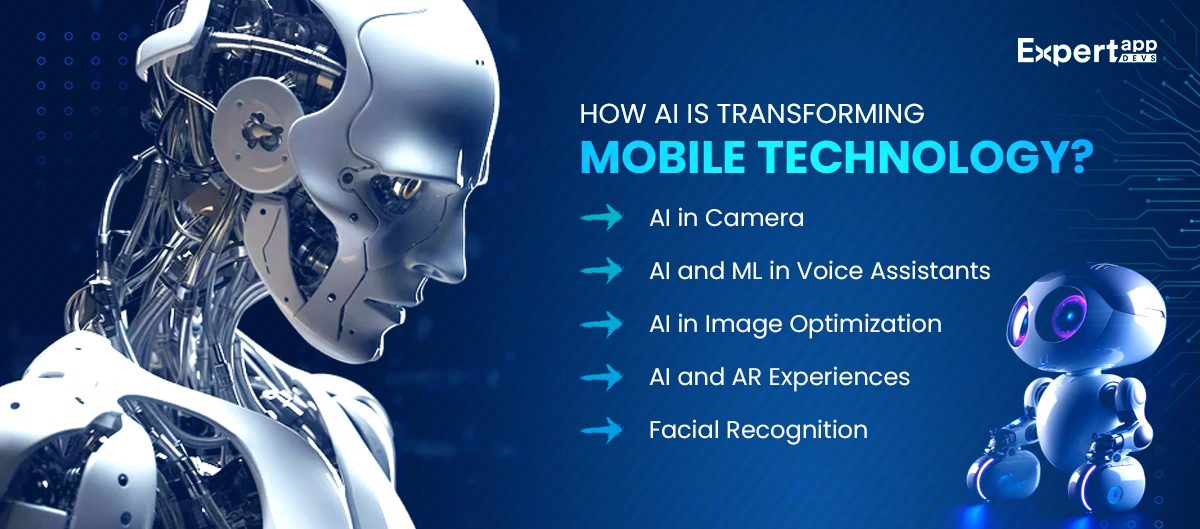
✓ AI in Camera
You will find AI-based cameras in highly advanced smartphones. AI-based cameras can predict whether you are capturing a person or a panorama and adjust filters accordingly. Also, AI cameras can help you change the right lens per the light conditions. You can use the power of AI to offer streamlined experiences.
✓ AI and ML in Voice Assistants
Advanced smartphones have high-end virtual assistance features for speech recognition and natural language processing. Voice assistants will undoubtedly play a pivotal role in our interface with smartphones.
✓ AI in Image Optimization
There are various features available in smartphones that automatically enhance the quality of images. Also, AI assists automatically store your images category-wise in the gallery.
✓ AI and AR Experiences
Apple's Animoji is an excellent example of how AI processors like neural processing engines. These targeted AI processors leverage AR and VR technologies to offer highly immersive and engaging user experiences.
✓ Facial Recognition
Advanced facial recognition can help secure your phone and also help with authentication. For example, features like True Depth create a 3D image of your face to authenticate payments and log in to mobile apps. Highly advanced AI and ML algorithms can help identify the face of the mobile owner, even when he is wearing glasses or with a beard.
Conclusion
Do you want to know how to create an app using AI? Well, we have dedicated an entire post to answer this question. Implementing AI in mobile app development will pave the way to automated processes, improved efficiency and productivity, and immersive user experiences.
Developers can leverage the immense potential of AI to build highly advanced AI apps with high-end features like natural language processing, voice assistants, and others. Utilizing AI capabilities in mobile phones will ensure greater user satisfaction and good ROI.
For businesses, AI comes up with endless opportunities and possibilities. You can get a competitive edge over your rivals by implementing Artificial Intelligence in mobile apps. AI-enabled apps can help businesses make data-driven decisions, predict user behaviors, improve customer interactions, and offer highly personalized offers.
Expert App Devs is an innovative AI app development company in the USA, UK, and UAE that provides AI-dedicated developers and app services from India to the globe. Our dedicated AI developers can leverage AI to build compelling, feature-rich, and user-centric mobile apps.
Read More:
- Learn How to Develop AI based Mobile App with React Native by following this comprehensive guide.
- Explore How Flutter App Developers Integrate AI Tech-Stack To Enhance Performance in this insightful article.
 Jignen Pandya
Jignen Pandya
